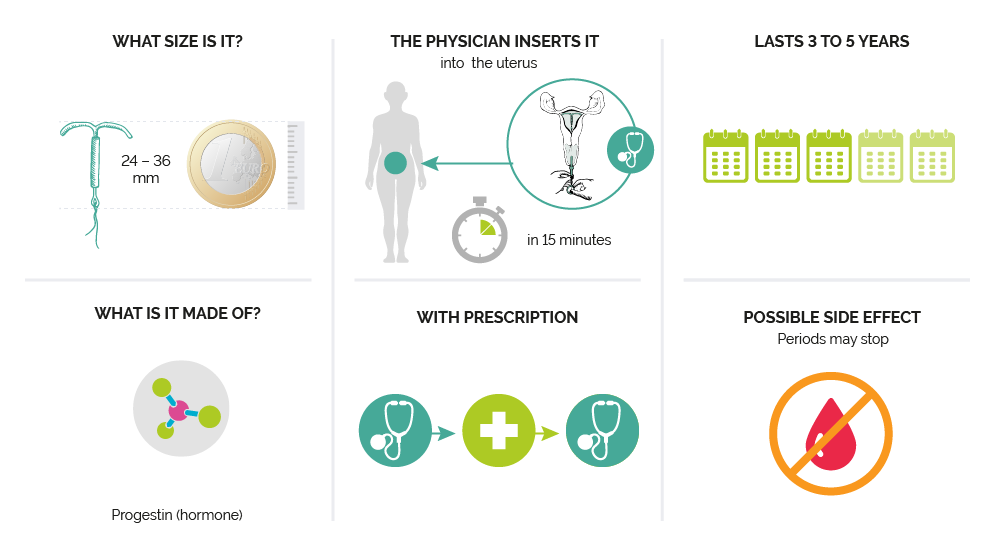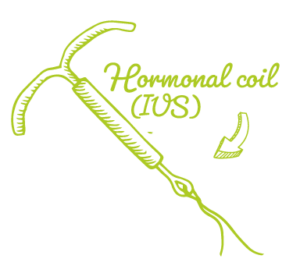The Hormonal IUD
The hormonal IntraUterine Device (UD) is inserted into the uterus by a physician and it continuously releases progestative hormones.
*Source: effectiveness percentages are taken from WHO (2018)
HOW DOES IT WORK?
It is a small device inserted by a physician or gynaecologist into the uterus that continuously diffuses a small amount of progestin (hormone). It thickens the cervical mucus, thins the endometrium, and alters the mobility of sperm. It is effective for 3 to 5 years, depending on the model.
With this method, menstruation may be much shorter or even absent. The hormonal-IUD can suit anyone, even people who never had children.
INTERESTING FIGURES AND DETAILS

HOW TO USE IT ?

BACKGROUND
Visit a physician or gynaecologist to receive a prescription.
STEP 1
Once you have purchased the hormonal coil at a pharmacy, schedule an appointment with a physician or gynaecologist.
STEP 2
Premedication with painkiller is possible to minimize discomfort during the insertion of the hormonal-IUD. There are two thin stings hanging down which come out of the cervix. After the insertion by the gynaecologist or physician, are cut to the right length to avoid possible discomfort during sexual intercourse.
STEP 3
An ultrasound check is usually performed within 6 to 8 weeks after insertion to check that the hormonal-IUD is properly placed. With the two thin wires, you can feel if the hormonal-IUD is still there.
WHERE TO GET IT?
Starting 1 April 2023, this contraceptive is delivered free of charge on medical prescription in any Luxembourg pharmacy to people affiliated with the National Health Fund, with no age limit.
For more information: click here.
This contraceptive can also be delivered for free at the Family Planning, including to people not covered by National Health Fund.
Hormonal IUD costs in average 144€* and last between 3 to 5 years.
*(This price is an average indication which may vary)
Advantages
- The hormonal-IUD is a very reliable contraceptive method.
- You don’t have to think about it every day or every time you are having sex. You are protected for several years depending on the brand of hormonal-IUD.
- It can be removed at any time by a physician if you want to get pregnant or change your contraceptive method. After the hormonal-IUD is removed, you will return to your original fertility level.
- You do not feel it, even during sex. Your partner usually doesn’t either.
- Suitable for women who are breastfeeding.
- The hormonal-IUD can be a solution for painful and heavy periods.
GOOD TO KNOW
- The hormonal-IUD does not protect against sexually transmitted diseases. Thus, remember to use a condom.
- Placing an hormonal-IUD is relatively quick but can be painful.
- With the hormonal-IUD, the menstrual cycle changes and is more unpredictable. Most women do not have periods at all, but it is also possible to have light bleeding at times. Therefore, this method does not allow you to postpone your period.
- There is no age requirement for using an hormonal-IUD, even a young woman without children can have an hormonal-IUD.

FREQUENTLY ASEKD QUESTIONS
Does the IUD cause sterility?
The hormonal-IUD, also known as the IntraUterine Device does not make you sterile nor infertile, whether it is hormonal or in copper. This contraception is reversible, i.e. fertility returns in the months following its removal. It simply prevents fertilization of the egg through the action of hormones.
Do I risk losing my IUD in the toilet?
No. But if you want to make sure it is there, insert two fingers into the vagina and look for the two threads. Do not pull on them. If you do not feel anything, consult your physician.
Is it possible to have an IUD inserted directly after giving birth?
It is not a bad idea, but the insertion of a hormonal IUD should not take place less than 4-8 weeks after delivery. It may take up to 12 weeks after delivery for the uterus to return to its original position.
Can the insertion or removal of a hormonal IUD cause pain?
The insertion of the IUD into the uterus can be a little painful, similar to the pain during menstruation. If you strongly anticipate pain, you can discuss this with your physician. There are several ways to minimise the pain, such as taking painkillers before and after insertion, or inserting the IUD during menstruation (the cervix is more open then), etc. However, it should be pointed out that the vast majority of women experience only mild, bearable pain, and that this pain subsides within 24 hours. The IUD can also be inserted outside the menstrual period.
Removal is usually painless. As the IUD is T-shaped, it folds back on itself, making it easier to remove.
If my IUD is removed, am I still protected for a few days?
No. The IUD, whether it is hormonal-type or copper-type, does not protect once it is removed. In fact, it is important not to have sex in the 5 days before the hormonal or copper IUD is removed. If you do, then you should keep the IUD and make an appointment for a later date. If you had sex in the last 5 days using another method of contraception (e.g. condom), then the IUD can be removed.
The reason? The copper IUD as well as the hormonal IUD does not prevent ovulation from occurring. At the same time, it is important to know that sperm can live for up to 5 days in the woman’s body. Thus, if ovulation, sexual intercourse and withdrawal take place within the same 5 days, this could lead to an unwanted pregnancy.
How long can you keep the same hormonal IUD?
The hormonal IUD can be kept for 3 to 5 years, depending on the model used. Consult your physician or gynaecologist for more information.
Note: If you are simply changing of IUD, the removal and insertion of the new IUDs are done on the same day to ensure continuous contraceptive coverage.
Do I have period while having the IUD ?
In 75% of cases, a person who has had a hormonal IUD inserted a year ago will no longer have a period, a phenomenon known as amenorrhoea. In the meantime, spotting, i.e. blood loss outside the period, may occur. If you are uncomfortable with bleeding or have questions about this contraception, do not hesitate to ask your physician, gynaecologist or pharmacist.
Is it possible to have an IUD inserted even if I have no children?
Yes, if you have no contraindications (e.g. a history of ectopic pregnancy – to be discussed with your physician), you can have an IUD inserted, even if you are a minor. These possible contraindications are identified by your physician. Do not hesitate to ask your health care professional questions.



